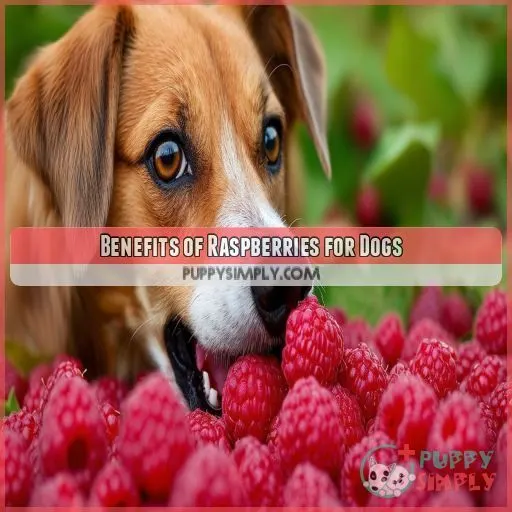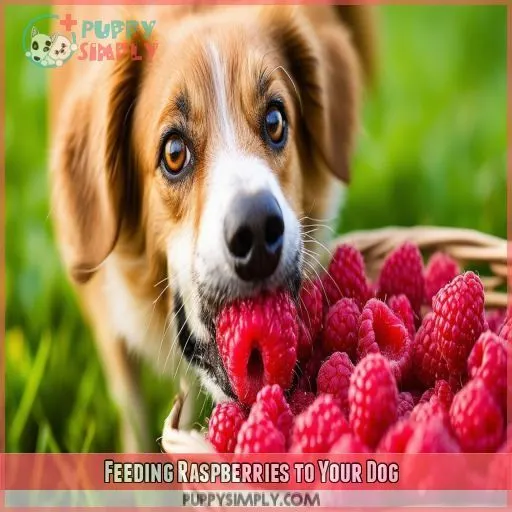This site is supported by our readers. We may earn a commission, at no cost to you, if you purchase through links.
 Yes, dogs can eat raspberries.
Yes, dogs can eat raspberries.
In fact, these sweet treats are a nutritional powerhouse for your pup, packed with vitamins, minerals, and antioxidants.
But remember, like with any snack, moderation is key.
Table Of Contents
- Key Takeaways
- Fruits and Vegetables for Dogs
- Can Dogs Eat Raspberries?
- Benefits of Raspberries for Dogs
- Feeding Raspberries to Your Dog
- Raspberries for Puppies
- Xylitol: a Danger to Dogs
- Consulting Your Veterinarian
- Frequently Asked Questions (FAQs)
- Are raspberries good for dogs?
- Can one eat raspberries if they have type 2 diabetes?
- Can a 20 lb dog eat raspberries?
- Can dogs eat frozen raspberries?
- How many raspberries can I give my dog?
- Why can’t dogs eat raspberries?
- What berries can dogs not eat?
- Are raspberry bushes toxic to dogs?
- How many raspberries can my dog eat?
- Are frozen raspberries safe for dogs?
- What are the signs of xylitol poisoning?
- Can I give my dog raspberries every day?
- Are there any health risks for puppies?
- Conclusion
Key Takeaways
- Raspberries are a safe and nutritious treat for dogs, offering vitamins, antioxidants, and fiber.
- Always be cautious of xylitol, a natural sweetener toxic to dogs, often found in sugar-free foods.
- Introduce any new food, including raspberries, gradually to your dog to avoid allergic reactions or tummy troubles.
- Consult your veterinarian for personalized advice on treating your dog to raspberries, especially regarding dosage and frequency.
Fruits and Vegetables for Dogs
You might be wondering if it’s safe to share your fruit and veggie snacks with your furry friend. Well, wonder no more!
There are plenty of fruits and veggies that are safe for dogs to eat and also offer a range of health benefits. Let’s get into the delicious details.
Safe Fruits for Dogs
While it’s tempting to share your fruity feast with your furry friend, not all fruits are safe for dogs. So, what’s a concerned dog owner to do?
Here’s a quick rundown of safe fruits that will have your pup’s tail wagging:
- Apples (minus the seeds and core)
- Bananas
- Blueberries
- Cantaloupe
- Mango
But remember, even safe fruits should be fed in moderation. Now, let’s check out why raspberries are a tasty treat for your canine companion.
Safe Vegetables for Dogs
Looking for some healthy treats for your furry friend? There are some good choices that your dog can enjoy as treats or mix-ins with their regular dog food. Here are some safe and healthy options:
- Broccoli: High in fiber and vitamin C, but serve it cooked to avoid choking hazards.
- Brussels sprouts: Packed with nutrients and antioxidants, but they may give your dog some gas.
- Carrots: A low-calorie, high-fiber snack that’s also rich in beta-carotene.
- Celery: Loaded with vitamins A, B, and C, and it promotes a healthy heart, too.
- Green beans: Full of important vitamins, minerals, and fiber, all while being low in calories.
Fruits and Vegetables to Avoid for Dogs
While you’re munching on a salad, your pup might give you those puppy dog eyes, begging for a bite. But hold your horses! Not all fruits and veggies are safe for dogs.
Some common fruits and veggies to avoid include:
- Avocados: The pit, skin, and leaves contain persin, a toxin that causes vomiting and diarrhea.
- Cherries: Cherry plants contain cyanide, which is super toxic to dogs. Keep an eye out for dilated pupils, trouble breathing, and red gums—all signs of cyanide poisoning.
- Grapes and raisins: These are a big no-no and can lead to sudden kidney failure.
- Tomatoes: The green parts of the plant have solanine, which is toxic. Even the ripe parts are best avoided.
- Onions, leeks, and chives: These are poisonous and can cause red blood cells to rupture.
Can Dogs Eat Raspberries?
You might be wondering if your furry friend can join in on your raspberry snack sessions. Well, the short answer is yes, dogs can eat raspberries. But there’s a catch, and it’s important to know the details before you share this tasty treat.
Nutritional Benefits of Raspberries for Dogs
Raspberries offer a range of nutritional benefits for your canine companion. Here are three key advantages:
- Dietary Fiber: This improves digestion and can help your dog maintain a healthy weight.
- Antioxidants: These powerful compounds may reduce the risk of serious health issues, including heart disease, cancer, diabetes, and arthritis.
- Vitamins and Minerals: Raspberries are packed with essential vitamins like C, K, and B-complex, as well as minerals such as potassium, manganese, copper, folic acid, iron, and magnesium.
Xylitol: a Potential Risk
Raspberries are a safe and healthy snack for dogs.
However, there’s a catch. Xylitol, a natural sweetener found in raspberries, can be toxic to our furry friends.
It’s a sugar substitute often used in sugar-free foods and gum, and even small amounts can be deadly.
This hidden danger can cause liver disease and hypoglycemia in dogs, so it’s important to be mindful of xylitol content in any treats you give your pup.
Potential Side Effects
Raspberries are a healthy treat for dogs.
Like with any new food, it’s important to be cautious.
Even though they’re safe for dogs to eat, some pups may have allergies or sensitivities.
Introduce raspberries gradually and watch for any signs of gastrointestinal upset like vomiting, diarrhea, or constipation.
If your dog experiences any adverse reactions, stop feeding them raspberries and consult your vet.
Benefits of Raspberries for Dogs
If you’re wondering whether your furry friend can indulge in this tasty treat, the answer is yes! Raspberries are safe for dogs to eat and they also pack a nutritional punch. From vitamins and antioxidants to digestive benefits, these berries offer a host of health advantages for your canine companion.
Rich in Vitamins and Antioxidants
Raspberries are packed with vitamins and antioxidants, making them a nutritious treat for your furry friend. Here are three key benefits of feeding your dog these tasty berries:
- Vitamin Boost: Raspberries are an excellent source of vitamins C and K, which are essential for your dog’s overall health and well-being.
- Antioxidant Power: The antioxidants in raspberries have anti-inflammatory properties, which can help reduce joint pain, especially in older dogs.
- Immune System Support: The combination of vitamins and antioxidants in raspberries gives your dog’s immune system a boost, helping them stay healthy and strong.
Low in Calories and Fat
Raspberries are a great low-calorie, low-fat treat option for your dog. This makes them a healthier alternative to other fruits that are high in natural sugars. You can feel good about offering your furry friend a tasty snack without worrying about packing on the pounds.
Good Source of Fiber
Your pup will thank you for adding raspberries to their diet, as they’re a great source of fiber. This helps with digestion and weight management, keeping things regular and their waistline in check.
Raspberries are like a natural broom, sweeping through their digestive tract and making it easier for your dog to, ahem, do their business.
Boosts Immune System and Skin Health
Raspberries are a superfruit for your dog’s immune system and skin health. Packed with antioxidants, these berries can reduce inflammation and joint pain, thanks to their anti-inflammatory properties. Plus, they’re a natural way to give your pup’s skin and coat a healthy glow.
Feeding Raspberries to Your Dog
So, can your dog join in on your raspberry snack sessions? Absolutely! But there’s a catch—you need to know the right way to feed them this tasty treat.
Let’s get into the details of how to safely incorporate raspberries into your dog’s diet and explore the different ways you can serve them.
Fresh or Frozen Raspberries
- Fresh raspberries: Pop a few fresh raspberries into your dog’s food bowl as a tasty treat.
- Frozen raspberries: Perfect for those hot summer days, Frozen raspberries become a cool snack that your dog will love.
- Mash and mix: Get creative and mash up some raspberries, then mix them with a dollop of yogurt or a smear of peanut butter for an extra-special treat.
Adding Raspberries to Dog Food
You can absolutely add raspberries to your dog’s food. In fact, doing so may even make their dinner taste better! Just be sure to follow these guidelines:
| Amount | Fresh or Frozen | Supervise |
|---|---|---|
| Always feed in moderation | Fresh is best, but frozen works too | Yes, especially if it’s their first time |
Mixing With Yogurt or Peanut Butter
You can also mix things up by mashing the raspberries and blending them with yogurt or peanut butter. This creates a tasty, healthy treat that your dog will love. Just remember to keep an eye on your dog when they’re eating these treats to make sure they don’t overindulge.
Raspberries for Puppies
Puppies can join the raspberry party, but there are a few extra things to keep in mind. Before feeding your pup these berries, it’s important to know how to introduce them safely and watch out for any allergies.
Introducing Raspberries Gradually
Introducing your puppy to raspberries? Go slow! Puppies have sensitive tummies, so take it step by step:
- Start with a tiny amount of raspberries (a few berries) and gradually increase over time.
- Mix the raspberries with their regular food or a favorite treat like yogurt or peanut butter.
- Observe your pup’s reaction—are they gobbling it up with no issues? Great! If not, slow down and consult your vet.
- Be mindful of any potential allergies or reactions. Puppies are more prone to food allergies, so watch for any signs of discomfort.
Monitoring for Allergic Reactions
Puppies are more susceptible to food allergies, so it’s really important to watch them closely for any signs of an allergic reaction when introducing raspberries.
Keep an eye out for common allergy symptoms like itching, hives, swelling, and gastrointestinal issues like vomiting or diarrhea.
If you notice any adverse reactions, stop feeding raspberries and consult your vet.
It’s always better to be safe than sorry when it comes to your furry friend’s health.
Consulting With Your Veterinarian
When in doubt, always consult your veterinarian. They can give you advice just for your dog and help you figure out dog nutrition. Here are some reasons why talking to a vet is helpful:
- Vet Knows Best: Your veterinarian is an expert in dog health and nutrition. They can check how healthy your dog is overall, think about their unique needs, and tell you if raspberries are a good idea for their diet.
- Safety First: While raspberries are usually safe for dogs, every dog is different. Your vet can help you find any possible risks or allergies your pup might have, making sure they get a safe and healthy treat.
- Dosage and Frequency: A balanced diet means getting the right amount of things. Vets can tell you how many raspberries to give and how often to include them in your dog’s meals or as treats.
Xylitol: a Danger to Dogs
While raspberries are a healthy treat for dogs, there’s a catch: xylitol. This natural sweetener, found in many human foods, can be toxic to dogs, causing liver disease and hypoglycemia.
Even small amounts of xylitol can be fatal, so it’s really important to always check ingredient lists before sharing treats with your furry friend.
Toxicity in Dogs
Raspberries are a tasty treat for your pup.
However, it’s important to be cautious about the hidden dangers of xylitol.
This natural sweetener, found in many human foods, can cause liver disease and hypoglycemia in dogs.
Hypoglycemia, or low blood sugar, can even be life-threatening if left untreated.
Always check ingredient lists for xylitol and keep those treats out of your dog’s reach!
Common Sources of Xylitol
Xylitol is a common ingredient in sugar-free products, so it’s important to be vigilant when giving your dog any human food. Here are three common sources of xylitol to be aware of:
- Gum
- Candy
- Toothpaste
Symptoms and Treatment of Xylitol Poisoning
Xylitol poisoning in dogs can have severe consequences, and it’s important to know the signs and act quickly. Here’s what to do:
| Symptoms | Treatment |
|---|---|
| Vomiting | Induce vomiting if your dog has recently ingested xylitol and call your vet. |
| Diarrhea | Consult your vet for advice on managing diarrhea. |
| Hypoglycemia | Seek emergency veterinary care. |
| Liver disease | Long-term monitoring and treatment may be required. |
Consulting Your Veterinarian
If you’re still unsure about feeding your dog raspberries or have concerns, it’s always best to consult your veterinarian. They can provide personalized advice based on your dog’s unique needs and health history, ensuring you make the right choice for your furry friend.
Personalized Advice on Feeding Raspberries
If you have concerns about your dog’s diet, your veterinarian is your best friend. They can offer personalized advice on feeding raspberries to your four-legged friend, taking into account their unique needs and health history.
Veterinarians: Your Go-To Experts
- They can guide you on the right dosage of raspberries for your pup, ensuring a safe and healthy treat.
- Vets are like nutritional detectives, offering specific advice based on your dog’s individual health puzzle.
- With their expertise, they can also suggest other tasty and nutritious treats to boost your dog’s health.
Determining Appropriate Amounts for Your Dog
If you’re wondering how many raspberries are safe for your furry friend, it’s always a good idea to consult your veterinarian.
They can give you personalized advice, taking into account your dog’s size, weight, and any unique health considerations.
While raspberries are a healthy treat, your vet can help you figure out the perfect portion size to keep your pup happy and healthy.
Exploring Other Healthy Treat Options
If you’re looking for more healthy treat options for your dog, consult your veterinarian. They can give personalized advice based on your dog’s unique needs and health history. Vets can also help you figure out how many treats to give your dog and suggest other safe options.
For example, fruits like apples, bananas, and blueberries are packed with vitamins and make great low-calorie treats. Vegetables like carrots and celery are healthy, low-calorie options, too. Just remember to introduce new foods slowly and keep an eye on how your dog reacts.
Frequently Asked Questions (FAQs)
Are raspberries good for dogs?
Yes, raspberries are good for your dog in moderation. They’re a great source of vitamins and antioxidants, low in calories and fat, and can help with digestion. But watch out for xylitol, a natural sweetener toxic to dogs.
Can one eat raspberries if they have type 2 diabetes?
Did you know raspberries are one of the best fruits you can eat with diabetes? They’re low in overall carbs and high in fibre. But remember, serving sizes vary per person, so test your blood sugar before and after eating.
Can a 20 lb dog eat raspberries?
Yes, a 20-pound dog can eat raspberries, but only 1-2 berries at a time. Raspberries are a healthy treat for dogs, packed with vitamins and antioxidants.
Can dogs eat frozen raspberries?
Frozen raspberries are a great way to give your pup a cool treat. Just make sure to supervise them while they enjoy this tasty snack.
How many raspberries can I give my dog?
Start with a few raspberries and see how your dog reacts. If they take to them well, you can give them a couple more next time.
Why can’t dogs eat raspberries?
While raspberries are safe for dogs in moderation, they contain xylitol, a natural sweetener that’s toxic to dogs and can cause liver disease and hypoglycaemia.
What berries can dogs not eat?
You’re right to be cautious—some berries are toxic to dogs. Avoid gooseberries, marionberries, salmonberries, and serviceberries. Also, keep your pup away from holly, juniper, and mistletoe berries. While strawberries are safe, they’re high in sugar, so limit treats to a few per day.
Are raspberry bushes toxic to dogs?
Raspberry bushes aren’t toxic to dogs, but it’s best to supervise your dog around them. Ingesting leaves or stems may cause gastrointestinal issues. If the plant’s been sprayed with chemicals, get vet advice.
How many raspberries can my dog eat?
It’s best to offer a few raspberries at a time as a treat and watch for any tummy upsets. Check with your vet about how many your dog can eat.
Are frozen raspberries safe for dogs?
Frozen raspberries are safe for dogs to eat, but they pose a choking hazard for puppies and smaller dogs. Always thaw frozen raspberries before feeding them to your dog.
What are the signs of xylitol poisoning?
Signs of xylitol poisoning in dogs include: weakness, stumbling, lack of coordination, lethargy, seizures, and vomiting. These symptoms can appear as early as 30 minutes after ingestion or be delayed for up to 12 hours.
Can I give my dog raspberries every day?
Can your pup handle raspberries every day? Well, they’re a great source of vitamins and antioxidants, but even healthy treats should be given in moderation. It’s best to offer raspberries as an occasional snack and stick to dog food for their main meals.
Are there any health risks for puppies?
Puppies can eat raspberries, but they’re more sensitive to food allergies than adult dogs. Introduce raspberries gradually and watch for reactions. If issues arise, stop feeding and consult your vet.
Conclusion
So, Can Dogs Eat Raspberries? Absolutely! These tasty berries are a nutritional bonanza for your four-legged friend, brimming with vitamins and antioxidants. Just remember, moderation is key, and always consult your vet if you have any concerns. Now you can confidently share this sweet treat with your pup, knowing it’s a healthy snack that boosts their health and happiness.












